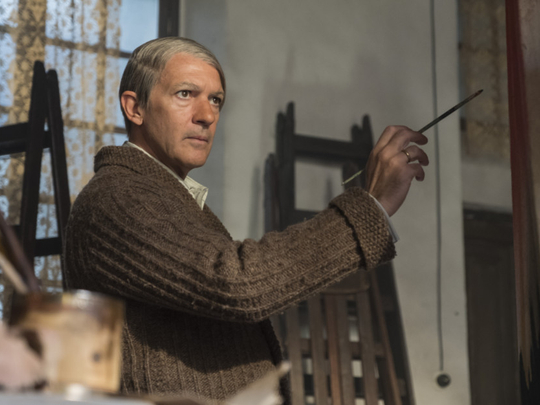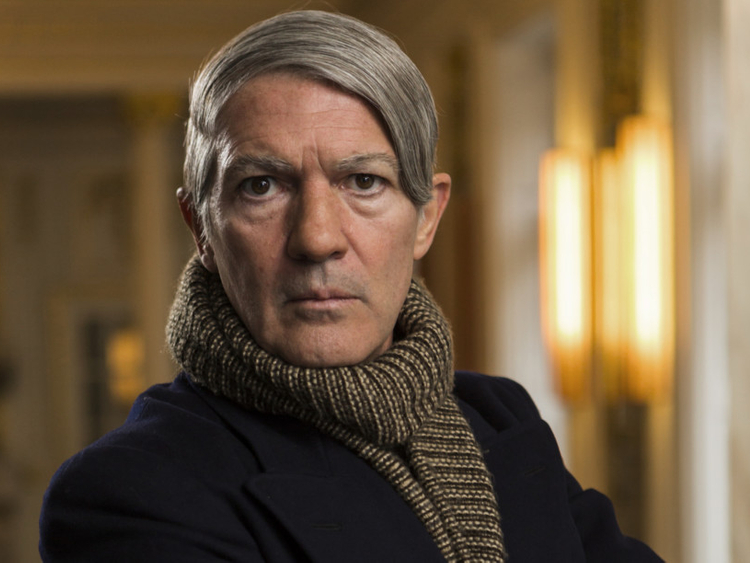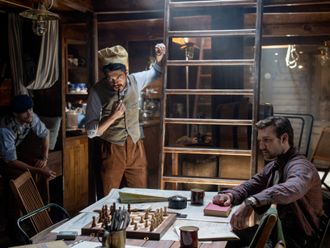
When showrunner Ken Biller asked to meet with Antonio Banderas, the actor had no idea that he was about to be offered the lead role in Genius: Picasso.
Banderas, from the same Spanish city of Malaga as Pablo Picasso, had been asked to portray the abstract painter countless times before. But this would be the first time he would say yes.
“I heard [executive producer] Ron Howard[’s name], and I thought… This guy is a god. He has big projects, always,” said Banderas. “I knew that I was in good hands. That was my first impression. Because it’s quality television. It’s well done. They have the time, the budget, the artistry, the people. It was good news.”
Banderas was a fan of the first Genius mini-series from National Geographic, which chronicled the life of theoretical physicist Albert Einstein. But he assumed it would be a single-season show. He was pleasantly surprised to find out there would be more geniuses explored, and that he would lead the second season as an older Picasso, from the middle of his life up until his death in 1973 at age 92. American newcomer Alex Rich would portray the artist in his younger years.
“We don’t start with the birth of Picasso in the first episode. We’re doing kind of a cubist painting with him. We’re going back and forth in ages, continually. In fact, I appear on the screen before Alex Rich does. And the [series] starts with the bombing of Guernica,” said Banderas.
The desire to do Picasso justice was particularly potent for Banderas.
“My relationship with Picasso is the relationship with somebody that was born in the same place he was born in, and in the same country. That is important. Because there were not so many international heroes in Spain at the time that I was born,” said Banderas.
“I remember going by the hand of my mum to school every morning and just crossing in front of the place he was born. He was this kind of very big shadow.”
Banderas, 57, also believed there were commonalities between himself and Picasso.
“[Picasso was] a man that took a step outside of Malaga, who lived the adventure of life outside. I did that, too, in different ages and from different circumstances,” he said, though he called it “stupid and ridiculous” to compare himself to “the most important artist, probably, of the 20th century.”
PHYSICAL TRANSFORMATION
On a chilly afternoon in Budapest in late January, Banderas sacrificed half of his lunch break to discuss his transformation into Picasso. He arrived in full prosthetics — exaggerated wrinkles, widened nose and bulked-up eyebrows.
“I’m not that old. I’ve got a wig on,” he joked, pointing out different areas of heavy make-up. “When I take this off at the end of the day, I’m going to feel like a million dollars.”
He sat for three hours of make-up that day. By the time he was playing Picasso in his 80s and 90s, he would have to sit in make-up for at least five.
“You have to know the value of your new eyebrows, the value of your new nose, and try to be as [fair] to your character [as possible],” said Banderas.
“The most challenging [aspect] doesn’t have to do with all the exterior appearance of him. Because at the end, you don’t come here with the idea of trying to make a wax museum. It’s relatively easy.”
Instead, the biggest challenge was understanding the motives behind all of Picasso’s actions. He was a volatile man, as stubborn as he was childish.
“You have to read continuously in between lines, trying to understand what was his truth,” said Banderas. “Because everybody owns, or wants to own, Picasso. You read the same event told by different people, and they’re different stories. So, which one is the good one?”
Banderas, like the rest of the cast, was well-aware of criticisms Picasso had received, particularly for mistreating women.
“There’s a lot of pain in all the relationships with Pablo. Pablo is very capable, very skilful, and that produced [a] certain arrogance in him, because he knows how good he is, and nobody can take that away from him,” said Banderas.
“[But] that produced not only pain in the women. People say, ‘He treated very [badly] women.’ No, people who were surrounding him in general can pay the price. He was very demanding with anybody who was surrounding him and got very impatient sometimes, if the people were not at that speed that he went. Then he abandoned them. He needed a new stimulus.”
In that way, Banderas said, this meant that Picasso often acted like a ‘big kid’.
“Kids are adorable, but when kids are 65 years old, it’s more dangerous. Because when you’re a kid, you say, ‘I don’t want that cake. I want that cake!’” explained Banderas. “He took things. And he took people. And he loved to have a new stimulus, somebody who can change his perception of reality.”
Picasso, who began painting classically in his teens, later broke the rules and explored abstract concepts in his art. He built a reputation as a genius of his field. But Banderas reckoned with the meaning of the word.
“First of all, we have to really try to define what the heck is a genius. It’s complicated. It’s very complicated. Is [it] somebody who does something good, new, that affects many people all around the world? Could be,” he said.
“There might be geniuses in politics. Even people who have done for humanity good. Is Mother Teresa a genius or not? Or are we just trying to talk about people who are in the arts and science?”
As far as Picasso, he was “constantly, until the day he died, thinking all the time, how can I be the revolution? How can I be the revolution? How can [Jackson] Pollock [dive] past me? No, no this new kid in America cannot pass me. I have to continue being a revolution,” said Banderas.
It was no simple task for the actor to step into shoes as large as Picasso’s. He had read, and continued to read, countless books about the artist’s life, penned by ex-lovers, family members, and journalists.
“There’s a big sense of responsibility with Picasso, because he was born in my land, because I’m going to be looked at [by] the world with a magnifying glass, because I know that it doesn’t matter how well you do it, I’m going to receive criticism,” he said.
But in a strange twist of fate, Banderas had already received the ultimate stamp of approval from Picasso’s daughter, Paloma, a ‘long, long time ago’ over dinner in Los Angeles.
“I didn’t never tell this story, but it’s true,” said Banderas.
“I start talking in Spanish with her… And I see her closing her eyes. I say, ‘Oh my god, I am boring this woman.’ Really! At some point, I swear, I said, ‘Are you tired? I’m boring you with my conversation.’ She said, ‘No, no, no. Do you know what happened? When I close my eyes, I can see my father. Because you speak with the same accent as my father.’”
Banderas was touched by the sentiment. If he had the opportunity to sit across from Picasso himself, his message to him would be simple: “I would tell him, ‘Come to Malaga.’... Look how much it has changed, your city,” he said. “It’s not so much ignorant people. There [are] beautiful things to watch. See your museum. You have a museum in Malaga. I would tell him that — to come, and open his heart to receive the biggest applause of his life.”
——————————
Don’t miss it! Genius: Picasso premieres on April 22 on National Geographic in the UAE at 9.50pm.














